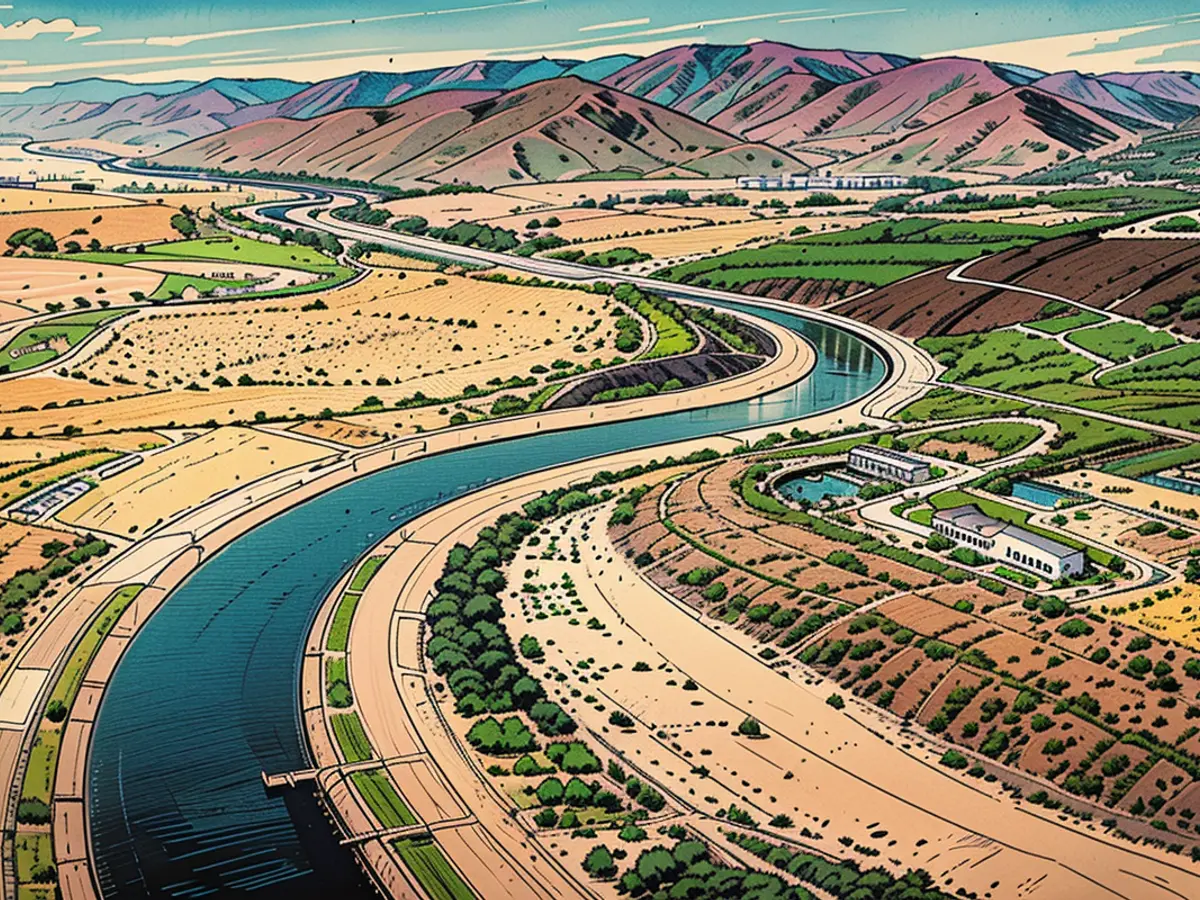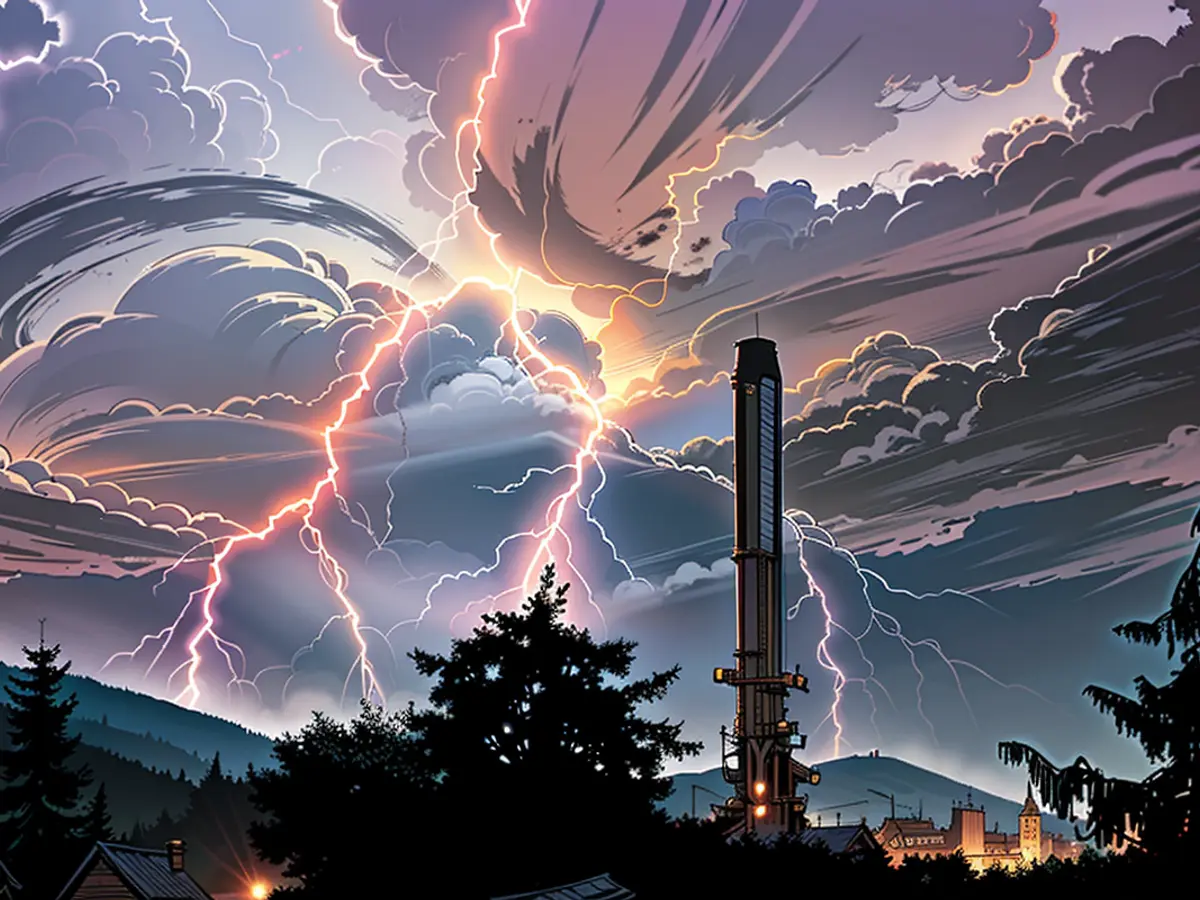Influence of the '50s Los Angeles 'Water Wars' shaped the creation of 'Chinatown'. These disputes over water resources continue to be relevant today.
Introducing a cinematic icon made five decades ago, "Chinatown" is a gripping tale set against the backdrop of a power struggle for water in the drought-stricken city of LA. The film scored several Oscar nominations, with Robert Towne's original screenplay winning one, and remains a significant work in the film noir genre, integrating a complex and emotional narrative while highlighting LA'sционever-controversial history of water acquisition.
At the heart of LA's narrative is the question of water access, a sordid history marred by corruption and misfortune. "Chinatown" offers a compelling portrayal of this water capture effort from the early 20th century, transporting viewers from the snow-capped Sierras to the bustling streets of LA.
As the film unfolds, private investigator Jake Gittes, played by Jack Nicholson, becomes entangled in the web of crime that defines 1930s LA, all in pursuit of a wronged woman, Faye Dunaway's character. In the process, Gittes uncovers a sinister plan to buy up cheap, barren lands on the city's outskirts, redirect water from distant sources, and thereby artificially inflate the land's value.
Truth and Hollywood fiction
Though the movie's narrative is largely accurate, it diverges from historical truth in two key areas, according to William Deverell, a professor of history at the USC Dornsife College of Letters, Arts and Sciences.
"The film portrays the scheme as secretive and conspiratorial, even leading to murder. However, the general population was well aware that, when the water came (and watered the newly-annexed lands), the wealthy would grow wealthier," Deverell revealed. "They accepted it, understanding that there was enough water and land to accommodate everyone."
Furthermore, the movie sets much of the long-distance irrigation depicted in the late 1930s, while in reality, the pioneering efforts to divert water from the Owens Valley, some 230 miles from LA, began as early as 1908 with the construction of the Los Angeles Aqueduct. Deverell regards this project as the primary inspiration behind "Chinatown."
Chaos and conflict
Despite these discrepancies, the real-life water struggles that inspired "Chinatown" were a cauldron of upheaval. The aqueduct was completed in 1913, leading to the desolation of adjacent areas and ultimately igniting a 1924 uprising by local farmers. They employed dynamite in an attempt to sabotage the infrastructure that was so consistently depleting their lands.

"The tensions and lawsuits around this issue persist even today, transitioning from territorial disputes to deep environmental concerns, all revolving around the controversial relocation of the Owens River hundreds of miles away," Deverell explained.
In the film, the murder of Hollis Mulwray, Dunaway's character's husband, serves as a catalyst for the ensuing action. In reality, engineer William Mulholland built the St. Francis Dam that famously failed in 1928, resulting in the largest loss of life in California history.
"His career was irreparably damaged following this disaster, despite our continued recognition of him through landmarks like Mulholland Drive," Deverell said, adding that his darker history remains largely overshadowed by accolades.
The modern "Water Wars"
As climate change exacerbates drought conditions in the region, the pursuit of water has continued to drive people to flout the law in their desperation. Dennis Falaschi, the former general manager of the Panoche Water District, was recently indicted for conspiring to steal millions of dollars worth of water over two decades. In late May, he pled guilty to one count of filing a false tax return, among other charges.
As we await Falaschi's sentencing in September, these instances serve as stark reminders of the ongoing struggle for this precious resource in one of the world's most water-deprived cities.
The accusation also points out that Mr. Falaschi was just one of several individuals who were unlawfully extracting water from the Delta Mendota Canal, a federally-owned waterway.
"There was this old, dilapidated, and seemingly abandoned irrigation setup that was pilfering water from the Delta Mendota Canal," Jessica Garrison, a Northern California correspondent for the Los Angeles Times, who heavily covered the Falaschi case, shared. Garrison elaborated that after this faulty equipment was found, instead of repairing it, they installed a gate and started secretly taking water without any means of measurement or detection, often under the cover of darkness.

Sounds like material for a blockbuster movie right there.
"If you take a closer look, water theft is rampant across the state," Garrison continued. "From farmers to famous actors, anyone attempting to cultivate something in California has been implicated in various water theft scams."
In fact, even actor Tom Selleck found himself in one of these cases, settling with the Calleguas Municipal Water District in July 2015 following accusations of diverting water to his ranch during a severe drought. And this doesn't even include the numerous other Hollywood celebrities who made headlines for allegedly violating local drought regulations, ranging from Sylvester Stallone, Kevin Hart, and the Kardashians.
A ‘timeless lesson’
"I think Chinatown's lasting appeal is that California, in some ways, is built upon pilfered water," Garrison mused, adding "there are numerous ways to steal water. You can steal it legally, steal a little bit, steal a large amount."
Deverell agreed with the sentiment. "We have an unhealthy obsession with water - which is one of the lines from the movie, yes, because we do," he said, referring to Southern Californians. "There's an assumption... that water is mundane, but it's anything but. The legal wrangling surrounding water, the fights, the schemes, the engineering, the uncertainties. Water is captivating. It's because it's so fundamental."
Although "Chinatown" has been around for over half a century, its underlying themes still resonate.
"After half a century... The underlying narrative about water and the intrigues surrounding water, its importance, Its fundamental nature, what people will do to get it, how desperate they will become," Deverell said. "That is a lesson for the ages. That is something we can all ponder to ensure that in our towns, our communities, our counties, our states, our regions that the desperation is kept to a minimum."


Read also:
The film "Chinatown" highlights the timeless issue of water scarcity and the lengths people will go to secure it, showcasing the powerful role of entertainment in raising awareness about such concerns. In contemporary Los Angeles, the struggle for water resources remains a relevant and contentious issue, underscoring the enduring relevance of the film's theme.
Despite some historical inaccuracies, the real-life water struggles that inspired "Chinatown" were marked by chaos, conflict, and upheaval, mirroring the film's depiction of a complex and contested world.








